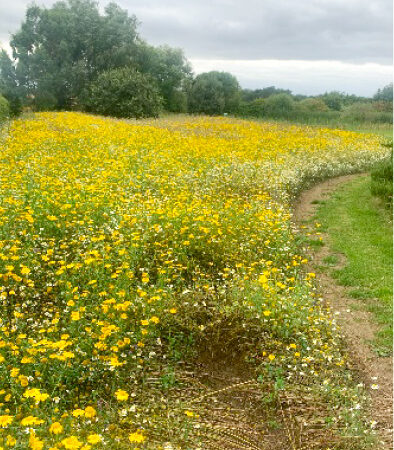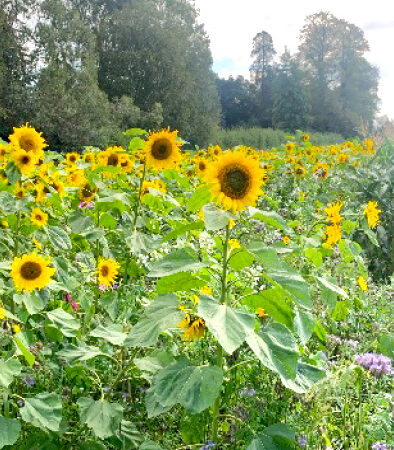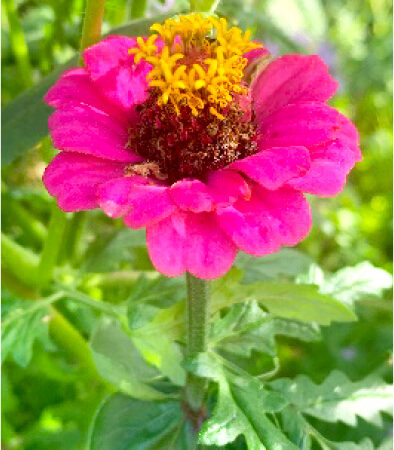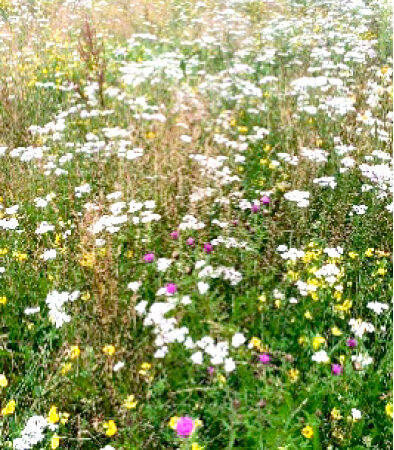Award recognition for supporting pollinators
We were thrilled to hear the announcement from DEFRA that Dyson Farming’s environmental team have been named winners of the Bees’ Needs Champions Awards in the farming category. Ian Willoughby, Environmental Coordinator, also received special mention in the annual awards that recognise and celebrate exemplary initiatives to support pollinators.
Our Ongoing Dedication
Dyson Farming covers 14000ha and has ten environmental stewardship schemes managing 1,300ha of environmental features. Alongside this is over 200ha of voluntary environmental features. Annual assessments of species diversity and site surveys are carried out at a field level. These surveys not only record the diversity, but also have located Andrena nitida one of the many solitary mining bee species that play such an important part in pollinating crops and wildflowers, this species had not been recorded in Lincolnshire for 100 years.
Increasing species within our grass fields has a benefit to animal health and improves flora within the sward. This is achieved by transferring green hay and spreading, to allow the sheep and cattle to forage and tread in the seeds, predominantly premium seed mixes, as well as overseeding specific seed mechanically and harrowing into the sward.
But it is not all about providing a food source, it is important to consider the wider picture. A proportion of hedgerows are managed by laying each year, creating dense growth from the base of the hedge giving greater shelter. While stonewalls are maintained to give niche habitats depending on the direction they face and woodland brash piles are left in rows or heaps from pruning’s which get grown in with grass and other vegetation, all to create the perfect conditions for insects to hibernate over the winter months.
Environmental Stewardship Placement
Strategic placement of environmental features at a landscape level can help maximise benefits for pollinating insects. Sheltered sunny spots are preferred for insects and in these locations the intense noise from there beating wings is a magical humming experience.
Within our potato farming, tramlines and irrigation headlands are not planted for operational reasons. Instead of allowing the land to stay bare, these areas are sown with intense annual flowers making a highway and perfect foraging ground for bees. Simultaneously allowing free movement of beneficiaries within the growing crop helping to control pests and diseases, while benefitting soil health for the following growing crops.
Woodland Management
To increase the flora diversity, we implement cyclical mowing of the rides every two years, and an annual mowing plan to encourage and increase prolonged flora diversity. Woodlands are managed under continuous cover forestry with some areas of coppice to increase flora species through the woodland.
Across the estate cover crops are a key factor to the extensive crop rotation and investment in soil health, although primarily used for soil health, this method protects and increases the soil flora and fauna but provides much needed late pollen and nectar for pollinating insects.
The grass and wildflowers margins that are against the edges of the fields provide foraging and shelter habitat for various species, allowing movement through the landscape along these species’ rich corridors. Blocks of pollen, nectar and wild bird cover features are evenly spread through the landscape to enhance the pollen and nectar provisions with the margins. Voluntary features link these corridors providing increased pollen and nectar that can be enhanced by altering drilling dates.
Advocacy for wildlife conservation
We work with local schools to aid a better understanding of the environment, where possible we build wildlife friendly areas within the school and link this with the importance of having pollinators and other species for food production.
In addition, we regularly hold talks with the local parishes, groups, scouts and engage with the local community though external talks and events to explain about ongoing environmental delivery and how resources within the environment are cared for.
There is a much wider public benefit and wellbeing piece of Dyson Farming’s environmental management, as many of the features border the extensive public and permissive footpaths across the Estate. A member of the public has previously said when referring to these areas ‘it makes me feel happy’, a very important benefit for all our mental and physical wellbeing.
The Estate Office,
Cyclone Way, Nocton,
Lincoln LN4 2GR






